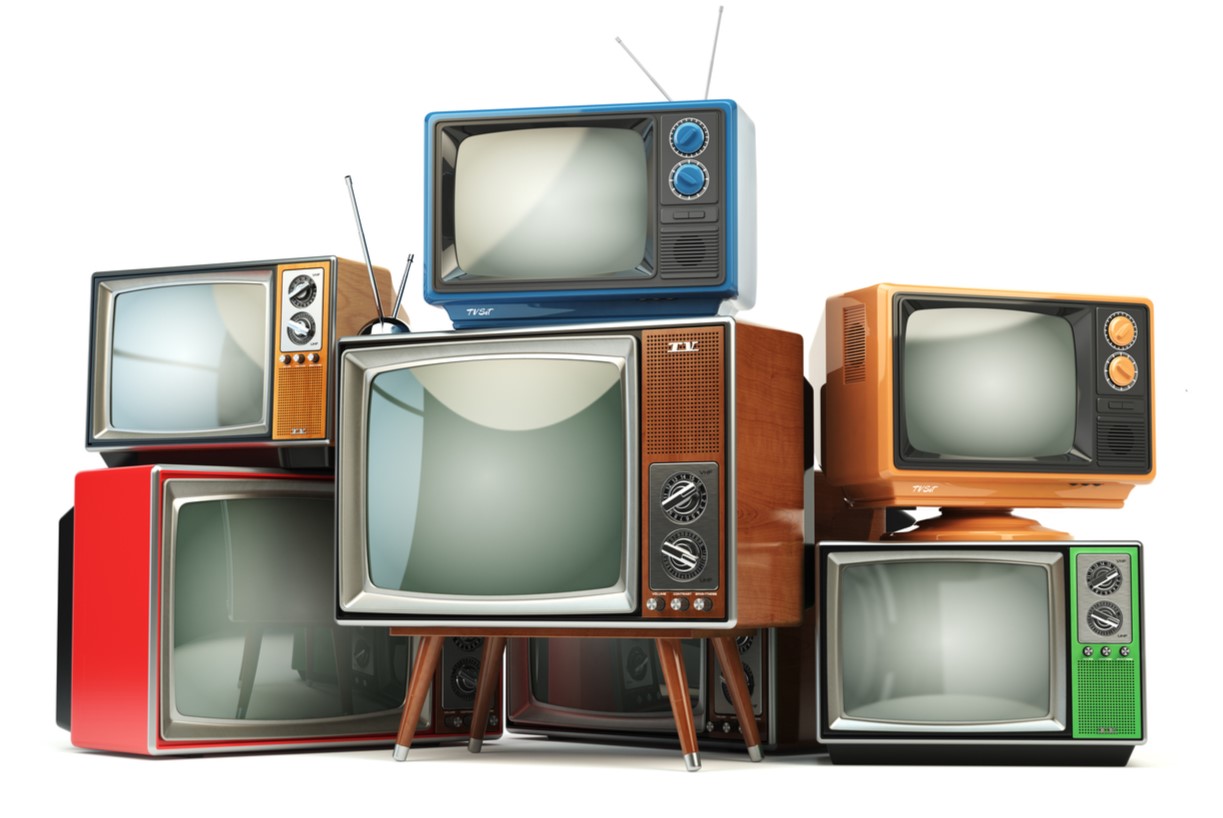Home>Technology>Home Entertainment Systems>How Television Changed The World


Home Entertainment Systems
How Television Changed The World
Published: December 20, 2023
Discover the impact of television on society and culture. Explore the evolution of home entertainment systems and their influence on the world. Learn more about the history and significance of TV technology.
(Many of the links in this article redirect to a specific reviewed product. Your purchase of these products through affiliate links helps to generate commission for Storables.com, at no extra cost. Learn more)
Introduction
Television has undoubtedly revolutionized the way we perceive and interact with the world. From its humble beginnings as a monochromatic box in the corner of living rooms to the sleek, high-definition screens that adorn our walls today, television has become an integral part of modern society. Its impact transcends mere entertainment, seeping into the very fabric of our culture, politics, and daily lives. In this article, we will delve into the profound influence of television on society, exploring its role in shaping culture, influencing politics and news, driving consumerism, and contributing to education and knowledge.
Television has not only entertained us but has also served as a window to the world, bringing distant events and cultures into our homes. Its power to shape opinions, drive trends, and educate the masses is unparalleled. Join us as we embark on a journey to understand how television has changed the world as we know it.
Key Takeaways:
- Television has changed the world by uniting people, shaping culture, and influencing politics. It has brought distant events into our homes, sparked conversations, and celebrated human diversity.
- Television has transformed advertising, influenced consumer behavior, and democratized education. It has created emotive brand experiences, broadened intellectual horizons, and made knowledge accessible to diverse audiences.
Read more: What Is The World’s Largest Swimming Pool
The Impact of Television on Society
Television has left an indelible mark on society, fundamentally altering the way we communicate, consume information, and perceive the world around us. One of the most profound impacts of television is its ability to bring people together, transcending geographical boundaries and fostering a sense of global interconnectedness. Through televised events such as the moon landing, sporting spectacles, and breaking news coverage, television has united audiences in shared moments of awe, triumph, and empathy.
Furthermore, television has redefined the dynamics of family life and social interaction. The advent of televised entertainment has provided families with a common source of leisure, sparking discussions and bonding over shared viewing experiences. Moreover, the proliferation of news and talk shows has facilitated conversations on important social and political issues, serving as a catalyst for societal introspection and change.
Television has also played a pivotal role in shaping cultural norms and values, influencing fashion trends, language, and popular discourse. Iconic television characters and personalities have become cultural touchstones, embodying and perpetuating societal ideals and aspirations. Additionally, television has been instrumental in amplifying underrepresented voices and shedding light on diverse perspectives, thereby fostering inclusivity and empathy within society.
However, the pervasive nature of television has not been without its challenges. The rise of screen time and sedentary lifestyles has raised concerns about the impact of television on physical and mental health, particularly among children and adolescents. Furthermore, the sensationalism and commercialization of televised content have sparked debates about the ethical responsibilities of broadcasters and the potential desensitization of audiences to violence and sensationalism.
Despite these challenges, the impact of television on society remains profound and multifaceted. Its ability to inform, entertain, and influence has positioned television as a formidable force in shaping the collective consciousness of humanity.
Television’s Role in Shaping Culture
Television has played a pivotal role in shaping and reflecting the cultural landscape of societies worldwide. Through its diverse array of programming, television has become a powerful medium for disseminating cultural narratives, preserving traditions, and catalyzing social change.
One of the most significant contributions of television to culture is its role in showcasing diverse perspectives and lifestyles. From sitcoms depicting the everyday lives of families to travel documentaries exploring far-flung corners of the globe, television has broadened cultural horizons and fostered a spirit of inclusivity. By portraying characters from various backgrounds and experiences, television has challenged stereotypes, promoted empathy, and celebrated the richness of human diversity.
Moreover, television has been instrumental in propelling cultural phenomena into the mainstream. From dance crazes and fashion trends to catchphrases and iconic moments, television has served as a cultural barometer, reflecting and amplifying the zeitgeist of different eras. The influence of television on popular culture is evident in the enduring legacies of classic shows, which continue to resonate with audiences across generations.
Furthermore, television has been a catalyst for societal dialogue on pressing cultural issues, ranging from gender equality and racial representation to LGBTQ+ rights and mental health awareness. Through thought-provoking dramas, informative documentaries, and impactful news coverage, television has sparked conversations, challenged societal norms, and advocated for social progress.
However, the pervasive influence of television on culture also raises questions about its responsibilities and ethical considerations. As a powerful shaper of public opinion, television must navigate the delicate balance between entertainment, representation, and social impact. The portrayal of sensitive cultural themes and the responsible depiction of diverse communities are critical considerations in ensuring that television contributes positively to the cultural tapestry.
In essence, television’s role in shaping culture extends beyond mere entertainment; it is a dynamic force that reflects, challenges, and celebrates the multifaceted nature of human society. As television continues to evolve, its potential to influence cultural narratives and foster cross-cultural understanding remains a compelling and transformative aspect of its legacy.
Television’s Influence on Politics and News
Television has irrevocably transformed the landscape of politics and news dissemination, reshaping the dynamics of public discourse, political engagement, and the flow of information. With its unparalleled reach and immediacy, television has emerged as a potent force in shaping political narratives, influencing public opinion, and holding leaders and institutions accountable.
One of the most profound impacts of television on politics is its role in democratizing access to information and political discourse. Through televised debates, town hall meetings, and live coverage of political events, television has empowered citizens to engage with political processes, scrutinize policy decisions, and participate in informed civic dialogue. The visual and auditory impact of televised political content has the potential to sway public sentiment and mobilize collective action, making it a formidable tool for political communication and advocacy.
Furthermore, television has redefined the nature of news consumption, ushering in an era of real-time reporting and 24-hour news cycles. The immediacy of televised news coverage has enabled audiences to stay abreast of global events as they unfold, fostering a heightened sense of interconnectedness and global awareness. Moreover, the visual storytelling capabilities of television have humanized distant conflicts and crises, eliciting empathy and galvanizing international responses to humanitarian issues.
However, the influence of television on politics and news dissemination also raises pertinent concerns about media bias, sensationalism, and the commodification of information. The commercial imperatives of television networks, coupled with the pressures of ratings and viewership, have prompted debates about the ethical responsibilities of broadcasters and the need for balanced, fact-based reporting.
Moreover, the rise of opinion-based programming and the proliferation of partisan news outlets have contributed to the polarization of political discourse, challenging the notion of a shared public reality. The phenomenon of echo chambers and selective exposure to ideologically aligned content has underscored the complexities of television’s role in shaping political beliefs and fostering informed citizenship.
Despite these challenges, television’s influence on politics and news remains a potent force for driving transparency, accountability, and civic engagement. As technology continues to evolve, the ethical and regulatory considerations surrounding television’s impact on political and news discourse will be pivotal in safeguarding the integrity of public information and democratic processes.
Television changed the world by connecting people across the globe, shaping popular culture, and influencing public opinion. It also revolutionized the way information and entertainment are delivered to the masses.
Television’s Effect on Advertising and Consumerism
Television has wielded a profound influence on the realms of advertising and consumerism, shaping consumer behavior, popularizing brands, and redefining the dynamics of marketing communication. The advent of televised commercials and product placements has not only propelled the rise of consumer culture but has also revolutionized the art of persuasion and brand storytelling.
One of the most significant impacts of television on advertising is its ability to create immersive and emotive brand experiences. Through visually captivating commercials, jingles, and compelling narratives, television has forged emotional connections between consumers and brands, imprinting lasting impressions and fostering brand loyalty. The visual and auditory stimuli of television advertising have the power to evoke desire, aspiration, and a sense of belonging, thereby influencing purchasing decisions and consumer preferences.
Moreover, television has served as a catalyst for cultural phenomena such as the Super Bowl commercials, which have become highly anticipated events in their own right, transcending traditional advertising to become cultural touchstones. The creativity and spectacle of televised advertising have elevated brands to iconic status, cementing their place in popular culture and collective memory.
Furthermore, television’s impact on consumerism extends beyond individual purchasing behavior to encompass broader societal trends and economic paradigms. The proliferation of televised shopping networks and infomercials has contributed to the commodification of lifestyle aspirations, fueling consumerist impulses and shaping societal notions of success and fulfillment.
However, the omnipresence of television advertising has prompted discussions about its ethical implications and the need for responsible marketing practices. The targeting of vulnerable demographics, the perpetuation of unrealistic beauty standards, and the potential reinforcement of materialistic values have sparked debates about the societal impact of televised advertising and the ethical responsibilities of advertisers and content creators.
As television continues to evolve in the digital age, the integration of targeted advertising, interactive content, and data-driven marketing strategies has ushered in new frontiers for consumer engagement and brand promotion. The convergence of television and digital platforms has expanded the reach and precision of advertising efforts, presenting both opportunities and challenges in navigating the evolving landscape of consumer culture.
In essence, television’s effect on advertising and consumerism has been transformative, redefining the dynamics of brand-consumer relationships and shaping the contours of contemporary consumer culture. As television continues to evolve, its influence on consumer behavior and marketing communication remains a dynamic force at the intersection of commerce and culture.
Television’s Contribution to Education and Knowledge
Beyond its role as a source of entertainment, television has significantly contributed to the dissemination of knowledge, the democratization of education, and the cultivation of intellectual curiosity. Through educational programming, documentary series, and informative content, television has served as a powerful medium for fostering lifelong learning, broadening intellectual horizons, and making knowledge accessible to diverse audiences.
One of the most impactful contributions of television to education is its ability to bring complex subjects and academic disciplines to life through compelling visual storytelling. Educational programs spanning diverse domains such as science, history, wildlife conservation, and cultural studies have engaged audiences of all ages, imparting knowledge in an engaging and accessible manner. The visual and auditory elements of television have the potential to demystify complex concepts, ignite curiosity, and inspire a passion for learning.
Moreover, television has played a pivotal role in supplementing formal education, particularly for learners in underserved communities or those with limited access to traditional educational resources. Educational channels and programs have provided a platform for interactive learning, skills development, and language enrichment, empowering viewers to acquire new competencies and expand their intellectual repertoire.
Furthermore, television has been instrumental in fostering a global perspective and cultural awareness through documentary filmmaking and travel programming. By showcasing diverse cultures, natural wonders, and historical narratives, television has facilitated cross-cultural understanding, empathy, and a sense of interconnectedness among viewers worldwide.
However, the educational potential of television also necessitates critical considerations regarding the quality, accuracy, and objectivity of educational content. The need for rigorous fact-checking, expert consultation, and inclusive representation in educational programming is paramount in ensuring that television serves as a reliable and enriching source of knowledge for audiences of all backgrounds.
As technology continues to evolve, the integration of interactive and immersive educational content on television has opened new frontiers for personalized learning experiences and adaptive pedagogical approaches. The convergence of television with digital platforms has expanded the reach and interactivity of educational content, presenting opportunities to tailor learning experiences to individual preferences and learning styles.
In essence, television’s contribution to education and knowledge has transcended traditional classroom settings, democratizing access to information, fostering intellectual curiosity, and enriching the intellectual landscape of global audiences. As television continues to evolve, its potential to inspire learning, cultivate critical thinking, and promote cultural literacy remains a transformative force in the realm of education.
Conclusion
Television has undeniably reshaped the world in profound and multifaceted ways, leaving an indelible imprint on the fabric of society, culture, politics, consumerism, and education. Its influence extends far beyond the realm of entertainment, permeating every aspect of human experience and interaction. As we reflect on the impact of television, it becomes evident that its power to inform, inspire, and influence has propelled seismic shifts in the collective consciousness of humanity.
From serving as a catalyst for global interconnectedness to redefining cultural norms and values, television has been a transformative force in shaping the collective identity of societies worldwide. Its ability to unite audiences in shared moments of triumph, empathy, and social awareness has fostered a sense of global citizenship, transcending geographical boundaries and cultural barriers.
Moreover, television has redefined the dynamics of family life, social interaction, and civic engagement, catalyzing conversations on important societal issues and fostering a spirit of inclusivity. The visual and auditory impact of televised content has not only entertained but has also challenged stereotypes, promoted empathy, and celebrated the richness of human diversity.
Furthermore, television has emerged as a formidable force in shaping political narratives, influencing public opinion, and fostering informed civic dialogue. Its role in democratizing access to political information, holding leaders accountable, and fostering civic engagement has been instrumental in driving transparency, accountability, and social progress.
Television’s impact on consumerism and advertising has been transformative, redefining the dynamics of brand-consumer relationships and shaping the contours of contemporary consumer culture. Its ability to create emotive brand experiences, propel cultural phenomena, and influence purchasing decisions has positioned television as a dynamic force at the intersection of commerce and culture.
Additionally, television’s contribution to education and knowledge dissemination has democratized access to learning, broadened intellectual horizons, and fostered a global perspective. Its role in making knowledge accessible, engaging, and immersive has empowered audiences to acquire new competencies, expand their intellectual repertoire, and cultivate a passion for lifelong learning.
As we navigate the evolving landscape of television in the digital age, it is imperative to recognize and harness its potential as a force for positive change, social awareness, and cultural enrichment. The ethical considerations surrounding television’s impact on society, politics, consumerism, and education are pivotal in safeguarding the integrity of public information, fostering inclusivity, and promoting responsible media practices.
In essence, television’s enduring legacy as a catalyst for global awareness, cultural enrichment, and societal dialogue underscores its transformative influence on the world. As we continue to embrace the evolving landscape of television, its potential to inform, inspire, and unite remains a powerful and enduring testament to its enduring impact on the human experience.
Frequently Asked Questions about How Television Changed The World
Was this page helpful?
At Storables.com, we guarantee accurate and reliable information. Our content, validated by Expert Board Contributors, is crafted following stringent Editorial Policies. We're committed to providing you with well-researched, expert-backed insights for all your informational needs.















0 thoughts on “How Television Changed The World”